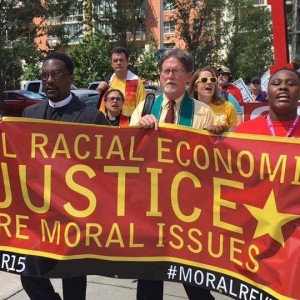Counter-Protest Against White Supremacist March
Two weeks ago, we witnessed a public exhibition of white supremacy, hate and bigotry in Charlottesville, VA. One person was killed and many more were physically injured. When we also consider emotional injury and trauma, the damage done by this event is horrific.
Yet, we also witnessed resistance—Love and compassion. Counter-demonstrators against the white supremacist rally included about sixty interfaith clergy and community leaders; many of our alums were among them. We asked some of them to tell us about their experience.
Rev. Jeanne Pupke, MDiv '04
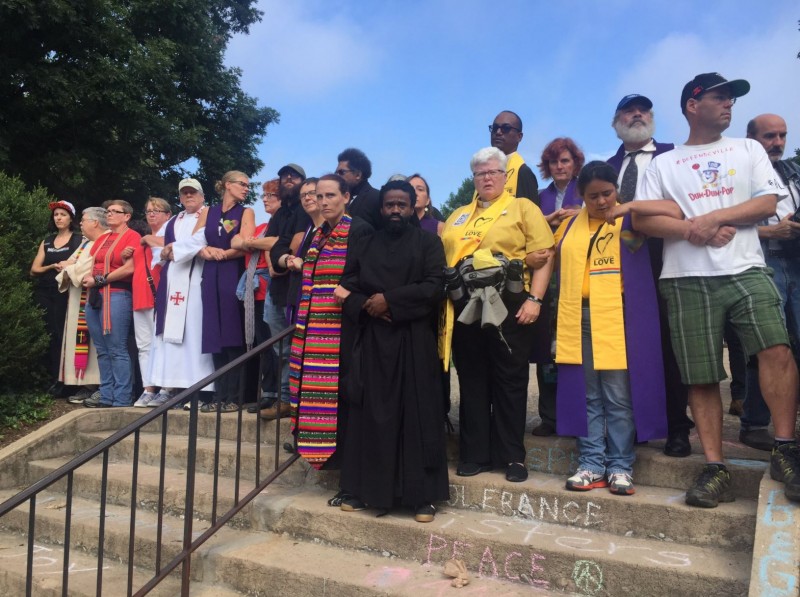
Rev. Jeanne Pupke (third from right in front row) is the Senior Minister at the First Unitarian Universalist Church of Richmond, VA.
"We hear so many reports that religion is no longer relevant in America, that it is a dying phenomenon, and yet by our simple presence in our clerical garb we sent the moral question forward, of how we will be human beings together on this planet.
"I did not arrive in Charlottesville in isolation. Meadville Lombard always made known the special obligation of relationship among those who do the work. When their work requires them to say 'Come,' the answer must be 'I will.'"
Elizabeth Ide, MDiv '17
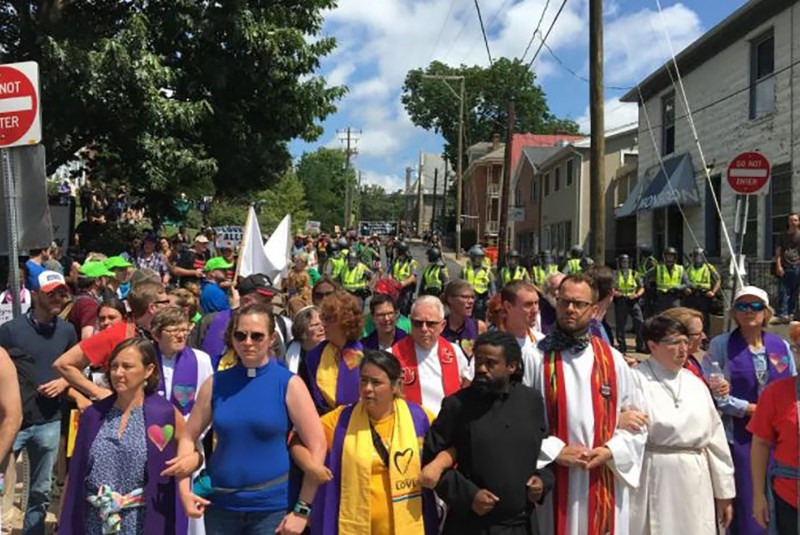
Elizabeth Ide (in blue shirt and sunglasses in the front row) just moved to Charlottesville in June after graduating from MLTS in May.
"On Saturday, August 12th, I began the day at a sunrise service held at First Baptist Church. My neighbors, colleagues, and I eagerly crowded into the pews and together we soaked into the power of a worship that lifted our hearts and charged our spirits. My years at Meadville Lombard prepared me to encounter my new neighborhood with openness, delight, and a clear-eyed gaze to meet the beauty that is as present in each place as the complicated stories trailing in the truth of every sentence about how this town was built and sustained by the grip of white supremacy. As we left the church that day and began lining up to march, a new story had already begun. The day Charlottesville rose up to send a message to the world that the spirit of love is alive in our city. Together, we would help one another to demonstrate the truth about who we are as a community connected by love.
"My coursework at MLTS included strong encouragement to cultivate a spiritual practice to develop a sense of the sacred. That training sustained me as I joined the nonviolent action and faced the white supremacists, as they carried out their repeated threats to terrorize our city. It was time to deal with the world, just as it was in the moment, and remain present. As I locked elbows with my colleagues and added my voice to the chorus, I held a connection to the spirit of love that was as real and as near as the sounds of our song. Immediately, our togetherness melted fear into determination and deep, abiding love.
"Threats became tragedies as the violence grew worse over the course of the day. Together, members of Congregate C'ville worked to respond to the chaos with a pastoral presence. The Meadville Lombard emphasis on collegiality and sincere recognition of the challenges of ministry contributed to my decision to attend training sessions on nonviolent de-escalation tactics and offer what I could to those who suffered the worst of the violence that Saturday. The connections formed with local UU and interfaith clergy are a source of guidance, love, and strength in the weeks following the 12th as I remain in Charlottesville to serve as a community minister, and I will always be grateful for the remote and personal support of our Meadville community."
Walter Clark, MDiv '16
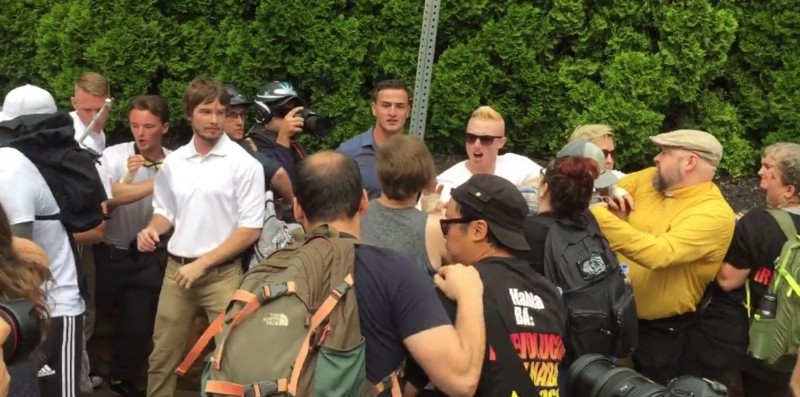
Walter Clark (in yellow shirt) found himself on the frontline of conflict, and as he shielded others, a white nationalist punched him.
"In the Community Studies year of Meadville Lombard's MDiv Signature Course program, students must do community service for 8 hours a week. It was during my time of community service that I learned about the ministry of presence. I volunteered at an elementary school in the city of Richmond and for the first few weeks I did whatever was asked of me; entering information into their database, helping in the lunchroom or running things back and forth to the office. On the surface, these tasks seemed insignificant, but they were what was needed at the time. My job was not to pick and choose tasks, but to do what was needed, when it was needed. My job was simply to be present, to serve and not to solve.
"I answered the call to Charlottesville because a ministerial presence would be needed. I had no specific agenda in mind when I arrived, knowing that if things did not become violent, my presence and support in the face of oppression would be valuable. As the tension and violence in the city began to unfold, I served the needs that were in front of me; helping those who were injured, comforting those who were shaken by what they saw and standing with other faith leaders when called. I simply served the needs that presented themselves.
"Meadville Lombard gave me so many tools to deal with the tragedy in Charlottesville. How to listen, how to empower those whose voices need to be heard, but most importantly, how to be present for others. They taught me how to serve."
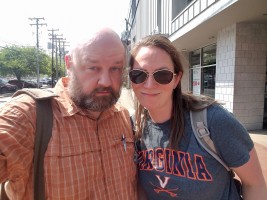 A few days after the incident, Elizabeth and Walter mourned, processed, and started healing, together as colleagues. We are grateful for—and very proud of—our alums and students who are leading and mobilizing their communities to show up against hate, and who don't hesitate to answer the call from those in need. Our world needs more leaders like Jeanne, Elizabeth, and Walter.
A few days after the incident, Elizabeth and Walter mourned, processed, and started healing, together as colleagues. We are grateful for—and very proud of—our alums and students who are leading and mobilizing their communities to show up against hate, and who don't hesitate to answer the call from those in need. Our world needs more leaders like Jeanne, Elizabeth, and Walter.
